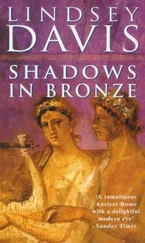Lindsey Davis - Alexandria
Здесь есть возможность читать онлайн «Lindsey Davis - Alexandria» весь текст электронной книги совершенно бесплатно (целиком полную версию без сокращений). В некоторых случаях можно слушать аудио, скачать через торрент в формате fb2 и присутствует краткое содержание. Жанр: Исторический детектив, на английском языке. Описание произведения, (предисловие) а так же отзывы посетителей доступны на портале библиотеки ЛибКат.
- Название:Alexandria
- Автор:
- Жанр:
- Год:неизвестен
- ISBN:нет данных
- Рейтинг книги:4 / 5. Голосов: 1
-
Избранное:Добавить в избранное
- Отзывы:
-
Ваша оценка:
- 80
- 1
- 2
- 3
- 4
- 5
Alexandria: краткое содержание, описание и аннотация
Предлагаем к чтению аннотацию, описание, краткое содержание или предисловие (зависит от того, что написал сам автор книги «Alexandria»). Если вы не нашли необходимую информацию о книге — напишите в комментариях, мы постараемся отыскать её.
Alexandria — читать онлайн бесплатно полную книгу (весь текст) целиком
Ниже представлен текст книги, разбитый по страницам. Система сохранения места последней прочитанной страницы, позволяет с удобством читать онлайн бесплатно книгу «Alexandria», без необходимости каждый раз заново искать на чём Вы остановились. Поставьте закладку, и сможете в любой момент перейти на страницу, на которой закончили чтение.
Интервал:
Закладка:
Apollophanes: Head of Philosophy
Nicanor: Law
Timosthenes: Curator of Serapeion Library
Normally there would have been two more: the Head of the Great Library and the Head of Medicine. Theon was detained at the undertaker's. Heras had said the medical post lay vacant for some reason. Helena scribbled queries as to why literature and mathematics were unrepresented; subsequently she arrowed all branches of literature, along with history and rhetoric, to the Head of Philosophy while the Astronomer had a remit for mathematics; I saw her scowl. For a start, she loathed the demotion of literature.
One thing struck me immediately. None of the names were Roman, or even Egyptian. They were all Greek.
As the morning wound on, Helena added opinions and pen-portraits. An 'L' meant Helena considered that man a candidate for the job at the Great Library. Those were the ones I watched most carefully. I had every faith in Helena's judgement on them. If Theon had been murdered, the shortlist would be my suspects.
Philetus: MDF's bugbear. And mine! Priest and poltroon.
Philadelphion: cheekboned charmer; ladies' man? No, just thinks he is. L
Zenon: Never speaks. Dumb or deep?
Apollophanes: Lofty. Director's toady.? L
Nicanor: Pompous. Thinks himself a cert for L – no chance.
Timosthenes: Too reasonable to survive here. Should be L
The agenda for the most part followed the pattern it must have had most days, which at least allowed those who hated meetings to nod:
Director's report: potential VIP visits
Faculty matters
Budget
Acquisitions: Librarians' reports (deferred from yesterday)
Discipline: Nibytas (deferred)
Progress on new Head of Medicine
New item: appointment of Chief Librarian
AOB: drama performance
It was typical of the Director's unfitness for office that he thought it more important to panic about the possible appearance in two months' time of a deputation of town councillors, on a spree from some Greek island, than to tackle Theon's demise yesterday. His only expressed interest in that incident was wittering about a replacement. The Library could have been full of bloodthirsty assassins and all Philetus wanted to do was put the next victim in a position to be attacked. He was a psychopath's dream. I did consider the possibility he might himself be a psychopath. (Was he uninterested in Theon's fate because he already knew what had happened?) Philetus certainly failed to understand or relate to other people. But I decided he lacked precision, compressed energy and the cold desire to kill.
Faculty matters were as boring as you think and went on twice as long as you imagine is possible. The Museion had no set teaching programme, which at least saved us endless wrangling between hidebound devotees of an Old Syllabus and thrusting exponents of some New; nor did they nitpick about removing the works of one old minor philosopher nobody had ever heard of in favour of another nonentity whose name would make the scholars groan. Philadelphion indulged in a ramble about how they ought to try to deter scholars' parents from approaching them full of unwise hopes. 'Better if they just send gifts!' commented Nicanor, the lawyer, cynically. The Director bemoaned the low standard of students' handwriting; he beefed that too many were so wealthy they were submitting theses that had been copied out for them by scribes – which increasingly meant that the scribes had really done the work. Philetus cared less that the students were cheating than that the scribes – mere slaves – were being permitted to acquire knowledge. Apollophanes boasted snidely that his scholars could not cheat because they had to declaim philosophy in front of him. 'If what they have to say is interesting enough to keep you awake!' scoffed Nicanor, implying with legal subtlety that it was not just the students in the philosophy faculty who were tedious.
Timosthenes wanted to talk about hosting public lectures, but they all pooh-poohed that.
The budget was dispatched briskly. The astronomer, Zenon, with his watching brief over mathematics, presented the accounts to the meeting, without any explanations. He just handed them round, then gathered them straight back in. Nobody else understood the figures. I tried to snaffle a set, but Zenon whipped all the copies away fast. I wondered if there was a reason. Helena wrote Money??? on her notes. After a moment she drew a circle around it for added emphasis.
Acquisitions had to be deferred because Theon was dead. However, Timosthenes reported on book matters at the Serapeion, which we deduced was an overspill library; it sounded well run. He offered to cover Theon's responsibilities at the Great Library on an ad hoc basis, but Philetus was too suspicious to let him. It was clear from Timosthenes' understated way of speaking, and his grasp of his own report, that he would have been a good stand-in. Philetus therefore feared him as a threat to his own position; nor would he appoint anybody else. He preferred to leave everything in limbo. Apollophanes made some flattering comment that it was 'wise not to over-react, wise not to be precipitous' (these carefully balanced lumps of sycophancy helped Helena and me to identify Apollophanes as the Director's toady). Everyone else at the meeting slumped despondently. It looked habitual.
They skipped discipline, so we never found out who Nibytas was or what he had done. Well, not that day.
There was absolutely no need to have the Head of Medicine appointment on the agenda every day, other than to allow Philetus to fidget pointlessly over a matter that had already been resolved. Philadelphion stifled a yawn and Timosthenes let himself close his eyes briefly in despair. A candidate had been chosen and appointed. He was on his way by sea. I asked where he was coming from: Rome. That seemed a radical move, until I heard he had trained in Alexandria: Aedemon, who worked for the well-to-do in Rome. Amazingly, Helena and I knew him, though we kept quiet. Association with us could damn the man before he stepped ashore.
When they reached the appointment of a new Librarian, everyone sat up. Waste of effort: Philetus only mumbled half-hearted regret over Theon. He made much of his own important role in composing a new shortlist for the post. He had no timescale. He had no finesse either. He enjoyed himself by saying, 'Some of you will be considered!' with a mischievous twinkle that made me feel ill. 'Others may be surprised to find themselves omitted.' He managed to suggest that those who slighted him need entertain no hopes.
Philetus sent out a clear invitation to engage in gruesome flattery and to give him expensive dinners. It stank. Still, Helena reminded me that in most of public life, in Rome too, that is how things work.
The discussion of the Librarian's post took less time than an endless wrangle under Any Other Business about some students wanting to produce a version of Aristophanes' play Lysistrata. The Board's objections were not to its saucy language or its dangerous theme of ending war, nor even to its portrayal of women organising themselves and debating their own role in society. There was serious doubt about the wisdom of allowing the actors, all male, to dress in women's clothes. No one mentioned that the play turned on withholding sex as a way for the female characters to influence their husbands. I overcame some of my boredom by looking around the board and wondering which of them even knew what sex was.
I might also have wondered whether any of these cultured beings was familiar with the play. But implying they might discuss a text they had not even read would of course be sacrilege.
The meeting broke up. It achieved nothing tangible. I had the impression that this daily torture never did.
Philetus sailed off to his room to be served mint tea. Apollophanes found an excuse to beg fawningly for a few words with his master. I was disappointed with this philosopher, who had seemed reasonable yesterday at the necropsy. That's how it goes. Decent men demean themselves in the hunt for career advancement. Apollophanes must have known that Philetus had an inferior mind and reprehensible ethics. Yet he sucked up to the man openly, in the desperate hope of the Librarian's job.
Читать дальшеИнтервал:
Закладка:
Похожие книги на «Alexandria»
Представляем Вашему вниманию похожие книги на «Alexandria» списком для выбора. Мы отобрали схожую по названию и смыслу литературу в надежде предоставить читателям больше вариантов отыскать новые, интересные, ещё непрочитанные произведения.
Обсуждение, отзывы о книге «Alexandria» и просто собственные мнения читателей. Оставьте ваши комментарии, напишите, что Вы думаете о произведении, его смысле или главных героях. Укажите что конкретно понравилось, а что нет, и почему Вы так считаете.












